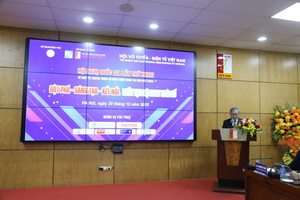
 Illustrative image (Source: VNA)
Illustrative image (Source: VNA)
According to a report from the Department of E-Commerce and Digital Economy at the Ministry of Industry and Trade, Vietnam’s e-commerce market grew 18 percent last year to US$11.8 billion, equal to 5.5 percent of the country’s total retail and service revenue.
The report revealed that 53 percent of the population engage in online sales activities, while 33 percent of consumers use online payments when shopping online.
Many enterprises view digital transformation as an indispensable means of improving operational efficiency and productivity as well as a foundation for their long-term development, according to Vu Dang Vinh, Director of the Vietnam Report JSC.
Vinh cited a Vietnam Report survey as finding that the majority of enterprises considered pioneers in digital transformation and who believe reform is key to overcoming challenges and seizing opportunities in the market are more successful in maintaining their operations and recover faster than others amid crisis.
There has, however, been a lack of specific roadmaps and balance between technology and internal resources at enterprises in regard to digital transformation, he said.
Most small and medium-sized enterprises (SMEs) have had few opportunities to access digital technologies, have not adopted a digital-based business mindset, and do not have the capacity to understand their customers, he went on, and don’t possess operational data collection and storage measures or a digital-based business strategy.
Meanwhile, a survey by the Ministry of Industry and Trade and the UNDP on nearly 2,700 businesses operating in 18 different industrial sectors regarding their level of readiness to access achievements from the Fourth Industrial Revolution showed that 82 percent consider themselves to be new at the process, 61 percent expressed no interest, and 21 percent said they had begun the process.
Vice Director of the Vietnam Institute of Digital Transformation and Innovation Pham Anh Tuan said digital transformation will only succeed if the operational procedures of enterprises are simplified to become smarter and their staff adopt modern working methods and have effective tools to interact with customers through multiple channels in a straightforward manner.
He explained that only large-scale businesses have sufficient capacity in finance and human resources to build technological infrastructure and databases.
SMEs, he said, should use shared technology infrastructure and databases developed by large digital partners and suppliers.
He also advised authorised agencies and businesses to change their thinking and understand that digital transformation is not just a trend or an IT project but requires comprehensive reform of business models, the way businesses operate and design products, and how they interact with customers and partners in the ecosystem.
























